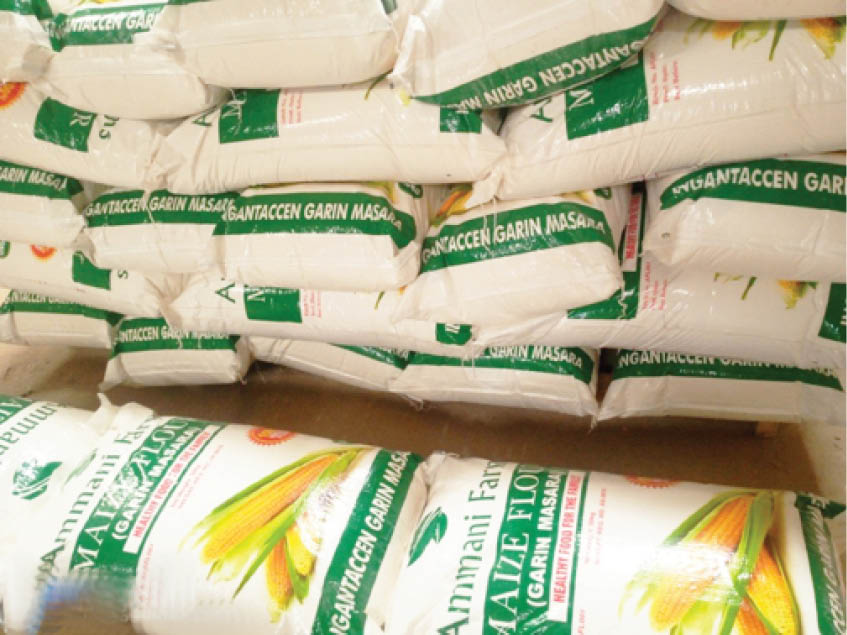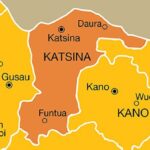Maize is the third most important cereal grown in Nigeria after sorghum and millet. It comes after wheat and rice in terms of world importance.
Some states that produce maize in large quantities include Nasarawa, Kaduna, Niger, Benue, Kogi, Katsina, Zamfara and Taraba.
- Oba of Benin, Obaseki differ on repatriation of looted artifacts
Nigeria makes history, shock US in pre-Olympic basketball friendly
Different products like corn flour, corn flakes, corn starch can be produced from maize seed. Maize flour is derived from grounded maize seeds and it is the second most produced and consumed flour after that of wheat, competing with rice flour.
In northern Nigeria, maize flour is a common stable for the preparation of a meal called ‘tuwo,’ consumed mostly at dinner time in an average home.
In the last 10 years, many individuals, especially women, have ventured into the business of making maize flour locally. Few succeeded in establishing cottage firms for their production, but many have since collapsed with the growing cost of production and incessant hike in market price of raw material (maize).
Most of the aize flour producers in the state were operating traditionally at home and were targeting local markets only despite
huge potentialities in the sub-sector.
Ammani Farms wades in
The Ammani Maize Flour Company, located along Funtua-Gusau Road in Katsina State cued in the venture sometimes in 2017, with the aim of professionalising the production and widening the market scope of the product, not only in the North but in the whole country.
According to the managing director of the company, Alhaji Abdulkadir Garba Ammani, the idea of the business was born out of the already established ‘Sai KaGani’ Farms, owned by a renowned businessman, the late Alhaji Garba Ammani Funtua.
The farm, according to the managing director, is now the primary source of raw material for maize flour production.
“Our late father established the farm in 1983 and basically produced maize, sorghum and reared animals such as cattle, sheep, goats, ostrich. He also produced fruits such as guavas, oranges, tangerines and the likes. After his demise, we ventured into the value chain of maize in 2017, and the company is cultivating maize in not less than 500 hectares out of more than 2000 hectares of the entire farm every year, from which we produce maize flour,” Alhaji Abdulkadir said.
He added that a high demand of stable food started with the outbreak of COVID-19, which, according to him, saw them buying maize grains from open markets in the area to cover the deficit of the one they were already producing.
He further said the company started its production with 25kg bags of the flower, which they were selling at the rate of N1,700 as at 2017. Later, they started producing 1kg, 2kg, 5kg, 10kg, and 50kg at the rates of N410, N820, N2,000, N3,700 and N17,600 respectively. The 25kg now is sold at N8,800, courtesy of the skyrocketing market price of farm produce coupled with the depreciation of naira value.
Our correspondent observed that in the value chain of their production, Ammani farms had chaff, main maize flour and what they called second flour, which they put on sale after every production.
According to the head of the mechanical unit of the company, the machines in use were all imported and have the capacity to produce 30 tonnes of flour per day.
“Production involves various stages, starting from that of destining of the maize grains, chaff removal and grinding of the produce to make the final maize flour before packaging. The packaging materials were majorly imported to Nigeria while the main sacks are locally produced,” he explained.
In terms of power supply, the engineer added that they were at an advantage because the factory was established near WACOT and SunFlour, therefore, the machines were on industrial power line.
“It is same with water supply as we are close to the Mairuwa dam,” he added.
Ammani said that for now, their product is being sold in Lagos, Oyo, Ogun, Abuja, Kaduna, Jigawa, Katsina and Sokoto, as well as the northeastern states.
“Our mission is to become a world class maize flour company in Nigeria. We are currently working on how our product can break the
markets in the South-East and South-South states. We have enough land for expansion and in the area of transportation. The company has its trucks and vans, which carry out the task of transportation of the products to the nook and cranny of the country,” Ammani said.
He added that very soon, the company would expand the market and become a major player in maize flour production in the country.
According to him, the company has not less than 60 members of staff – administrative, technical and casual – so far working in both factory and the farm of the company.
On other sectors of the farm and the future of the company, Ammani said plans were underway to start yoghurt production.
“Beside maize flour, there are plans to start yoghurt production of whole cow milk as we have foreign cattle meant for milk production in the farm,” he said.
He added that running a company required discipline in order to maintain standard and stay in the market no matter the level of competition.

 Join Daily Trust WhatsApp Community For Quick Access To News and Happenings Around You.
Join Daily Trust WhatsApp Community For Quick Access To News and Happenings Around You.

